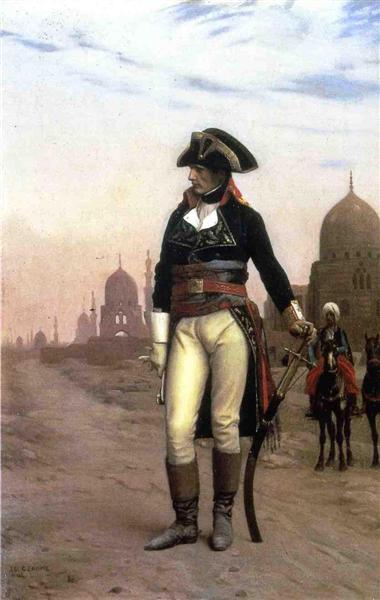Description
Jean-Léon Gérôme, a leading representative of 19th-century French academicism, captured in his work Napoleon in Egypt (1868) a snapshot of majesty that transcends time, evoking both a romantic interest in the exotic and admiration for the historical figure of Napoleon Bonaparte. This painting is set in a period where historical narrative and artistic representation are intertwined, transforming gebeurtenissen into images of sublime beauty and symbolic depth.
The composition of the work is a clear reflection of Gérôme’s meticulously detailed style. In this painting, Napoleon is seen, dressed in an imperial uniform, riding a majestic white horse. The choice of white color not only highlights his figure amidst a desert environment, but also symbolizes his purity and authority. The setting of the scene is intentionally dramatic; the background reveals an arid landscape of dunes that blends into a deep blue sky, where soft clouds can be seen evoking the atmosphere of sunset.
The figure of Napoleon is central and dominant, forming the axis from which the elements surrounding his presence develop. However, not only the figure of the emperor stands out in the painting, but other less visible characters can also be seen, who seem to witness his majesty from the desert background. This suggests that the narrative is not limited to the singular image of Napoleon, but encompasses the context of his Egyptian campaign and his encounter with a culture that fascinated Europe.
Known for his penchant for orientalist subject matter, Gérôme employs a richly nuanced palette that reinforces the atmosphere of wonder and mystery surrounding Egypt. Subtle gold tones seen in the clothing and surrounding details invite the viewer to immerse themselves in a world of luxury and splendor. The attention to detail is exemplary; the embroidery on Napoleon’s uniform and the finishing of the horse are meticulously rendered, evidencing the artist’s technical prowess and dedication to the accurate representation of reality.
It is interesting to note that the work also forms part of a period when artists were beginning to take an interest in the impact of non-Western cultures on art history. Gérôme fits into this context, since his representation of Egypt is not only historical, but is part of a romantic construction of the exotic, leading the viewer to an enriching sensory experience.
The development of Napoleon in Egypt must be seen in the light of the European fascination with colonial expeditions and the exoticism they entailed. In this sense, Gérôme's work aligns with other works from the same period that address similar themes, such as the representations of other academic artists who explored oriental themes, creating a visual dialogue around the exaltation of the different and the remote.
Gérôme's gaze thus becomes not only a reflection of a historical event, but a link between the past and the present, challenging the viewer to reflect on the figure of Napoleon not only as a ruler, but also as a symbol of imperialist aspirations and dreams. Thus, "Napoleon in Egypt" transcends its apparently narrative format and becomes a visual compendium of the complexity of human history and the perpetual quest for greatness.
KUADROS ©, a famous painting on your wall.
Hand-made oil painting reproductions, with the quality of professional artists and the distinctive seal of KUADROS ©.
Painting reproduction service with satisfaction guarantee. If you are not completely satisfied with the replica of your painting, we will refund 100% of your money.

